There is a possibility that I'm going to finish my current book before midnight, but I kind of doubt it. I had the last two or three hours blocked out for reading, but something came up, and I don't think I'm staying up until midnight, anyway, so I'm going to just go ahead and say I only read two books in December, rather than three.
The two books were:
1) Jon Morris' Legion of Regrettable Supervillains was an interesting glance at some of the more hilariously bad villains that have graced the pages of comic books over the years, but I think it spent too much time in the Golden Age, and missed some real modern era clunkers like Nanny, Dr. Mayavale, or Orca the Whale Woman.
I breezed through this like I did the companion book, The League of Regrettable Superheroes last year. I didn't learn much in either case, but I was entertained.
2) I took most of the month reading Paul Theroux’s Deep South because I was thinking about it a lot as I read. Over the course of four seasons (spread, I think, over two years), Theroux gets in his car in New England and drives south, over back roads and highways, avoiding major cities and instead focusing on small towns across the southern US. Along the way, he goes to festivals, barbershops, churches, cafes, gun shows, small businesses, social support agencies, and anywhere else that he thinks people will talk to him. And they do love to talk to him, telling their stories and the stories of people before them.
Between talking to people, Theroux also discusses the literature of the South, and mixes in some history. What he really focuses on, though, is poverty, both generational and recent (mostly due to factory closings as jobs move overseas), and the ways in which the US is failing its own people while giving millions to countries abroad to build schools, homes, and farms. Theroux talks to people in the back woods, the hollers, and the Mississippi delta who don’t have electricity, who still use outhouses, and who have no hope for change, and wonders why our government and many global charitable foundations aren’t doing more for them. Reading this, I wonder the same things. I'm not saying we shouldn't help other countries, but we could definitely do a better job taking care of our own.
It was a decently long book, so I don't feel too badly about my poor December showing, but I think two books in a month is my lowest showing for a couple of years, at least.
Saturday, December 31, 2016
Thursday, December 29, 2016
Spider-Man: Rock Reflections of a Superhero
Long, long ago, when my friend Kristin still lived in North Carolina (actually, two years ago), I went out to visit, and one day we went to the Ava Gardner Museum, but didn't actually go inside because it was closed. We did go inside some antique stores, though, where I bought a little bit of Pyrex and this record:
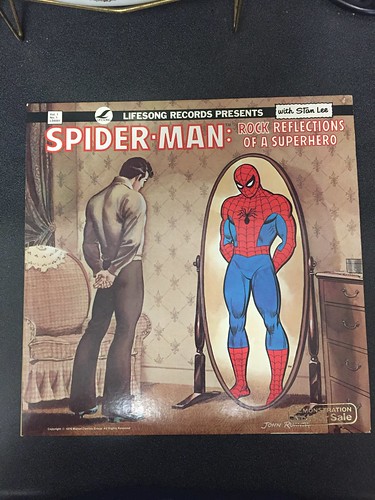
It looked interesting, but also maybe a little bit cheesy, especially when I looked at the back:
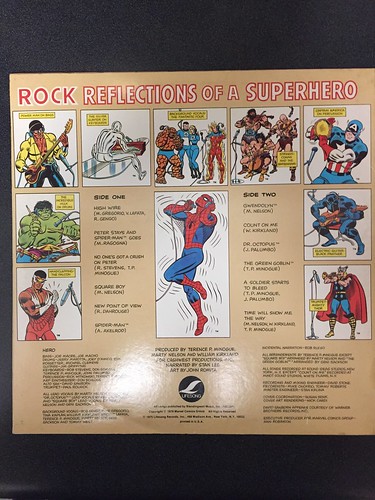
and saw all the pictures of how the singing and music were all allegedly performed by Marvel Comics characters like the Hulk and the Falcon:
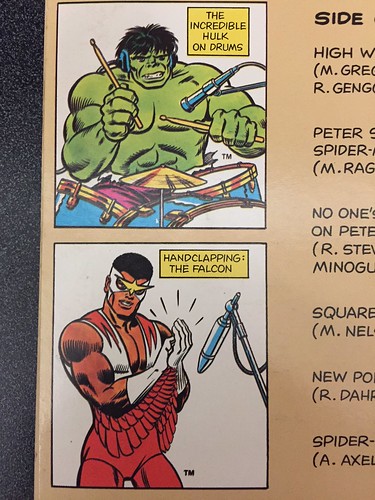
Conan (On strings? Really? Violins weren't even invented yet) and Captain America:
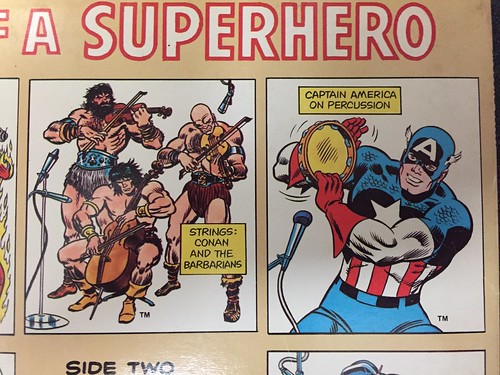
and even the Fantastic Four:
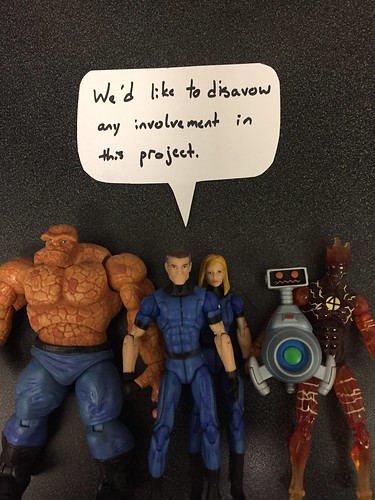
Too late, Reed. You're on the cover art:
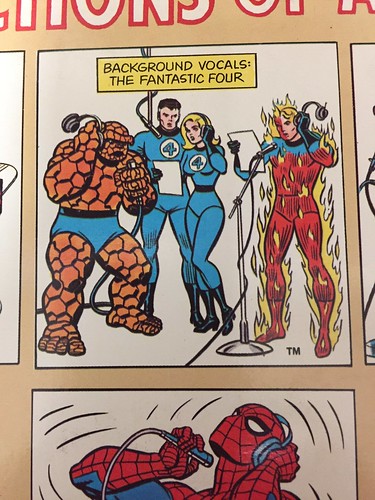
The song titles were intriguing, as they hinted at stories but, by themselves, didn't actually tell one: "No One's Got a Crush on Peter" was probably about Peter Parker's awkward high school years, as was "Square Boy". "Peter Stays and Spider-Man Goes" might be a reference to Amazing Spider-Man 50, a well known issue from the 1960's when Peter decides that he's done being Spider-Man, but other songs could mean anything: "High Wire"? "Count On Me"? Others were fairly obvious. There's no mistaking what "Dr. Octopus" or "Green Goblin" are about, since those are some of Spider-Man's best known foes.
And "Gwendolyn" is clearly about Gwen Stacy, Peter's first girlfriend, a character who should have been in all of the Spider-Man movies but only ended up being in some of them because Peter was married to Mary Jane Watson during the 90s (before he sold his marriage to Satan) and the movies had to match the comics and cartoon. Although she's been a little mishandled by writers since her death (looking at you, Straczynski) and readers today generally only see her as a sweet, smiling girlfriend in flashback scenes, Gwen Stacy in the 1960's was an independent woman who fought for women's rights and functioned as more than just a love interest.
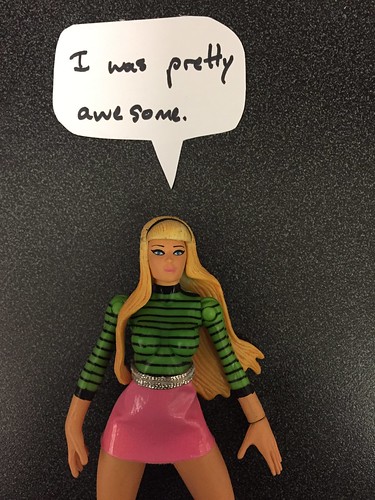
She was, but I'm digressing. I just got really irritated that the Tobey Maguire movies didn't even have Gwen until the third (and worst) one, and then she was pretty undeveloped as a character. I wasn't a big fan of the Andrew Garfield movies, on the whole, but at least they had the right love interest, and she was well written.
Back to the album, all I could do was guess at what was inside, because I don't have a record player.
This Christmas, though, my parents changed all that, not by giving me a record player, but by getting me this CD:
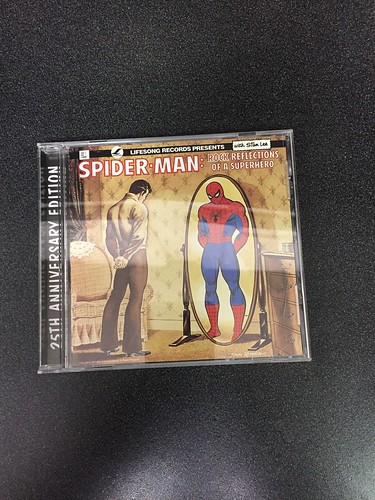
It's all I've listened to in the car since Christmas, and it's very entertaining. There's not really any new art:
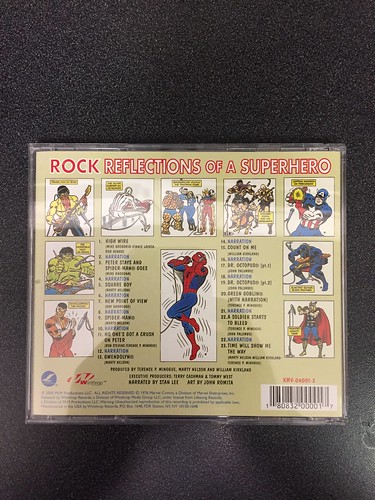
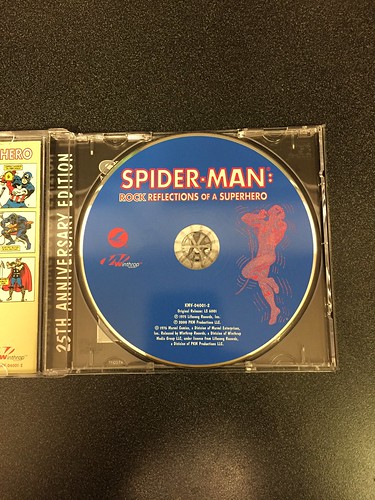
other than this weirdly creepy photo of someone in a Spider-Man costume holding the original record:
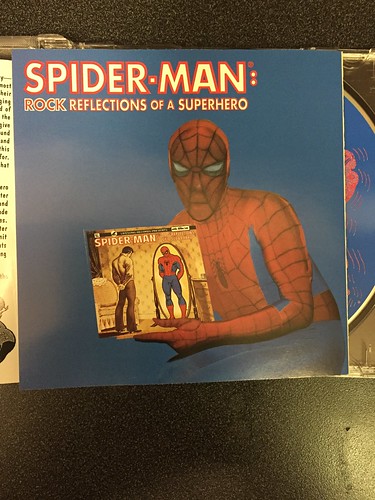
but it does have a story from Mike Ragogna, a songwriter from the original album who was 17 at the time, about how the record came to be:
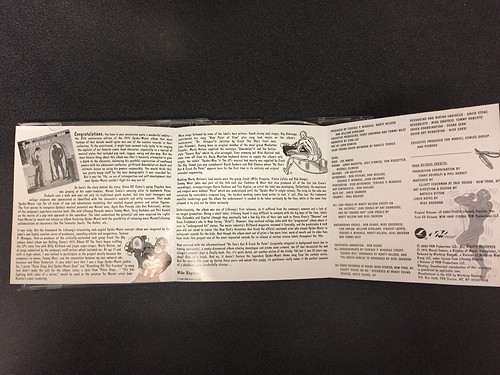
which basically boils down to "Marvel was making a ton of money licensing Spider-Man out for pretty much anything, so they asked Lifesong Records to make a Spider-Man rock album."
While that story is interesting, the album itself is, too. It's like listening to a Broadway show that didn't actually exist, with the songs telling a story that's linked together by narration between each song, spoken by none other than Stan Lee himself. Shockingly, he doesn't overact it, and there's something about listening to a story of Spider-Man, a hero whose identity is grounded in being from New York City, told in Stan Lee's unpolished New York accent that makes it all even better. The general plot is that Peter is doubting himself, and looks back on his beginnings as Spider-Man, his self-doubt, and finally his resolve to be a better hero. Sadly, it also touches on the death of Gwen at the hands of the Green Goblin, an event that shaped Spider-Man's character for decades to come and which was kind of terrible to relive while driving to the grocery store.
The songs themselves are kind of a mixed bag of styles and impact, and the album is a little reminiscent of Joseph and the Amazing Technicolor Dreamcoat in the way that every song is a different musical style. Some of them sound very 60's and 70's, with "Dr. Octopus" and "A Soldier Starts to Bleed" reminding me a lot of the ensemble songs in Hair, but some of the songs probably sounded pretty dated already when this came out in 1975. That's not surprising, coming from a company that rolled out (no pun intended, given her roller skates) Disco Dazzler in 1981, when disco was already pretty much dead.
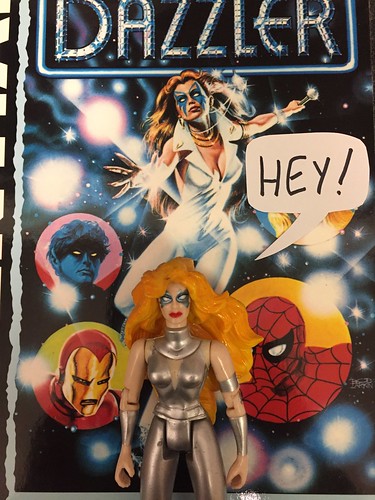
Sorry, Dazzler. I love you, but it's true.
It's an interesting album for comics fans, but I'm not sure how much non-fans will get out of it. I think the best song on the album turned out to be "Peter Stays and Spider-Man Goes", but your mileage may vary.

It looked interesting, but also maybe a little bit cheesy, especially when I looked at the back:

and saw all the pictures of how the singing and music were all allegedly performed by Marvel Comics characters like the Hulk and the Falcon:

Conan (On strings? Really? Violins weren't even invented yet) and Captain America:

and even the Fantastic Four:

Too late, Reed. You're on the cover art:

The song titles were intriguing, as they hinted at stories but, by themselves, didn't actually tell one: "No One's Got a Crush on Peter" was probably about Peter Parker's awkward high school years, as was "Square Boy". "Peter Stays and Spider-Man Goes" might be a reference to Amazing Spider-Man 50, a well known issue from the 1960's when Peter decides that he's done being Spider-Man, but other songs could mean anything: "High Wire"? "Count On Me"? Others were fairly obvious. There's no mistaking what "Dr. Octopus" or "Green Goblin" are about, since those are some of Spider-Man's best known foes.
And "Gwendolyn" is clearly about Gwen Stacy, Peter's first girlfriend, a character who should have been in all of the Spider-Man movies but only ended up being in some of them because Peter was married to Mary Jane Watson during the 90s (before he sold his marriage to Satan) and the movies had to match the comics and cartoon. Although she's been a little mishandled by writers since her death (looking at you, Straczynski) and readers today generally only see her as a sweet, smiling girlfriend in flashback scenes, Gwen Stacy in the 1960's was an independent woman who fought for women's rights and functioned as more than just a love interest.

She was, but I'm digressing. I just got really irritated that the Tobey Maguire movies didn't even have Gwen until the third (and worst) one, and then she was pretty undeveloped as a character. I wasn't a big fan of the Andrew Garfield movies, on the whole, but at least they had the right love interest, and she was well written.
Back to the album, all I could do was guess at what was inside, because I don't have a record player.
This Christmas, though, my parents changed all that, not by giving me a record player, but by getting me this CD:

It's all I've listened to in the car since Christmas, and it's very entertaining. There's not really any new art:


other than this weirdly creepy photo of someone in a Spider-Man costume holding the original record:

but it does have a story from Mike Ragogna, a songwriter from the original album who was 17 at the time, about how the record came to be:

which basically boils down to "Marvel was making a ton of money licensing Spider-Man out for pretty much anything, so they asked Lifesong Records to make a Spider-Man rock album."
While that story is interesting, the album itself is, too. It's like listening to a Broadway show that didn't actually exist, with the songs telling a story that's linked together by narration between each song, spoken by none other than Stan Lee himself. Shockingly, he doesn't overact it, and there's something about listening to a story of Spider-Man, a hero whose identity is grounded in being from New York City, told in Stan Lee's unpolished New York accent that makes it all even better. The general plot is that Peter is doubting himself, and looks back on his beginnings as Spider-Man, his self-doubt, and finally his resolve to be a better hero. Sadly, it also touches on the death of Gwen at the hands of the Green Goblin, an event that shaped Spider-Man's character for decades to come and which was kind of terrible to relive while driving to the grocery store.
The songs themselves are kind of a mixed bag of styles and impact, and the album is a little reminiscent of Joseph and the Amazing Technicolor Dreamcoat in the way that every song is a different musical style. Some of them sound very 60's and 70's, with "Dr. Octopus" and "A Soldier Starts to Bleed" reminding me a lot of the ensemble songs in Hair, but some of the songs probably sounded pretty dated already when this came out in 1975. That's not surprising, coming from a company that rolled out (no pun intended, given her roller skates) Disco Dazzler in 1981, when disco was already pretty much dead.

Sorry, Dazzler. I love you, but it's true.
It's an interesting album for comics fans, but I'm not sure how much non-fans will get out of it. I think the best song on the album turned out to be "Peter Stays and Spider-Man Goes", but your mileage may vary.
Sunday, December 11, 2016
A Tale of Two Fudgies
It's December, and my holiday traditions are in full swing. I just did the Jingle Bell Run this weekend, I've already started fielding concerned calls about being all alone at Christmas (I'm fine, everybody, I swear; I have something planned for every single day that we are off from work), I've misplaced the ice scraper for my car and will go buy a new one knowing that this will make the old one appear, and I bought the Carnation Famous Fudge Kit for my yearly adventure in kitchen masochism.
Before we walk through the inevitable disappointment of opening this year's box:
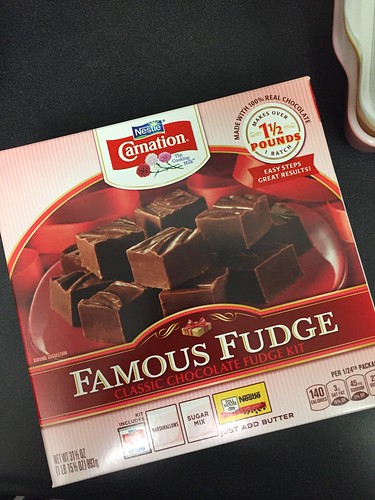
(why do I take a new picture of the box every year?), I want to take a minute to talk about last year's fudge. As you may recall, I made three kinds to take to work with me: the fudge kit, my Uncle Mike's pumpkin spice fudge, and Velveeta fudge.
I really need to explain why you should never make or eat Velveeta fudge, no matter how many family members or old ladies in the grocery store swear by it.
The fudge kit fudge turned out the best that this stupid box has ever turned out for me. That includes this year, which we'll get to in a minute. People at work ate it, but no one talked about it being great fudge or delicious or anything. They ate it the same way that people in our office will eventually eat any food that you leave in the breakroom, but no one seemed to enjoy it. People did seem to enjoy the pumpkin spice fudge. They ate it quickly, except for the people who don't like peanut butter and didn't eat any of it, and mentioned without prompting that it was tasty.
And then there was the Velveeta fudge.
No one ate the Velveeta fudge. Even I didn't eat the Velveeta fudge after the one piece to evaluate it for the blog entry. Over the course of the week, though, something happened to it. It started out soft, but by the end of the week it somehow got softer and less substantial, even though we were keeping it in the office fridge. It got almost spongy, but still looked the same, and then it started... discorporating? Dissolving? I don't know the word for what happened to it, but it began to leak an odorless clear liquid, and at the end of the week I threw it away along with its container, just in case it was cursed.
Do not make the Velveeta fudge, even for your enemies.
Maybe don't make them the Carnation fudge, either.
I decided last year that the trick to making the fudge kit is not to care about making the fudge kit. If you follow all of the instructions to the letter and second, the kit doesn't work. If you half-ass your way through it, though, you get something passable, like my mom, my friend Elizabeth, my friend Bernadatte, and me last year. It's not the best fudge you ever had in your life, but it's passably decent. This year I approached it the same way. I boiled the sugar and milk mix:

dumped in the chocolate chips and marshmallows, and then spread it in the pan, and just like every year I could tell immediately that it looked grainy and choppy and like an old pioneer woman's face:
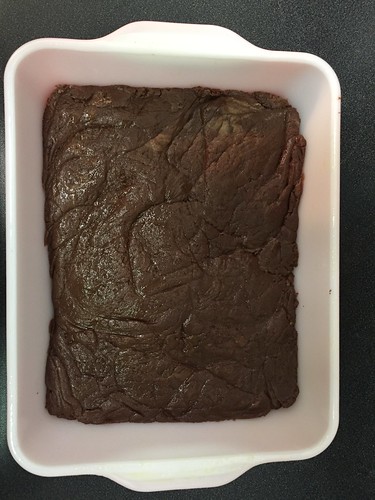
I put it in the refrigerator to set, and got to work on my friend Jim's fudge recipe.
Jim sent me his recipe after I liked a photo on Facebook of the fudge houses he made. His fudge turns out so well that he pours it into silicone molds and makes objects out of it. He swore that I would be able to follow it without trouble, and at this point I would try any fudge recipe if it looked even halfway promising. I made fudge last year out of processed cheese food and powdered sugar, for God's sake. Does that seem like the kind of thing that a person who is afraid to take chances on fudge recipes does? No, it does not.
I am no longer afraid of any fudge recipe.
I have stared into the Velveeta fudge abyss, and the Velveeta fudge abyss has stared into me also.
Not that Jim's recipe was an abyss. It actually was really easy, just like he said. It started with heating up light corn syrup, chocolate chips, and condensed milk:

and then, when it was melted:
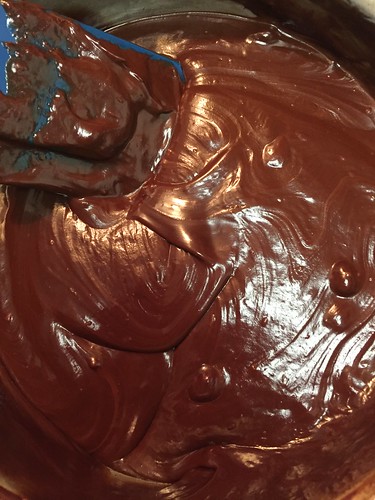
I removed it from the heat, stirred in the vanilla, and then sifted in powdered sugar.
I also screamed, "THIS IS THE FUDGE! THIS IS THE FUDGE ON THE BOX!" because it was. It was glossy and smooth and poured easily and I could even smooth the top. It was like thick frosting. I've been fooled before, though, so I tried to keep my hopes low as I put it in the fridge and ignored it for two hours. There was every chance that it would crystallize, or remain liquid forever, or do whatever the Velveeta fudge did to itself. Just because it looks good doesn't mean it is good, especially in my fudge workshop.
When I took it out of the fridge, though, it still seemed promising. Note the contract with the fudge kit fudge:
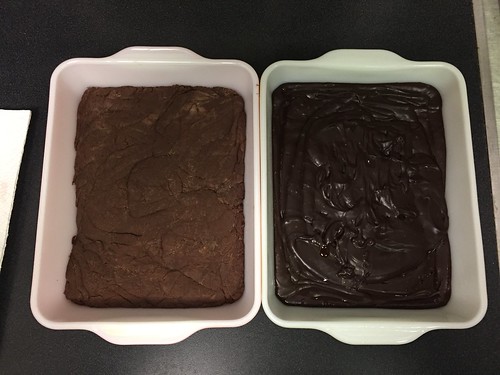
and then note the finished products:
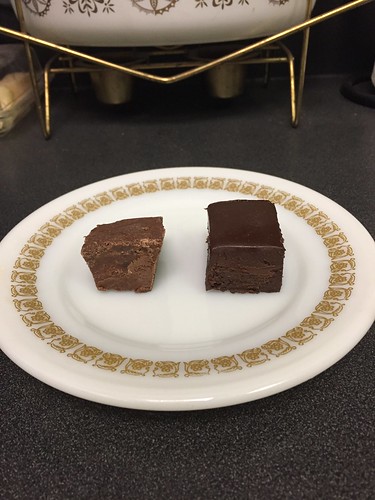
One of those is a gritty, crumbling disappointment that finds new ways to hurt me every time I try to make it, and one of those is a soft, creamy, delicious square of shiny fudge that looks exactly like the perfect fudge on the box that a food stylist spent hours making out of modelling putty and a thin sheen of glycerin. I'm taking them both to work tomorrow, but I bet my coworkers will be a lot more thankful for my friend Jim than they will be for Carnation's stupid box kit.
Now I just need a foolproof recipe for peanut butter fudge.
Before we walk through the inevitable disappointment of opening this year's box:

(why do I take a new picture of the box every year?), I want to take a minute to talk about last year's fudge. As you may recall, I made three kinds to take to work with me: the fudge kit, my Uncle Mike's pumpkin spice fudge, and Velveeta fudge.
I really need to explain why you should never make or eat Velveeta fudge, no matter how many family members or old ladies in the grocery store swear by it.
The fudge kit fudge turned out the best that this stupid box has ever turned out for me. That includes this year, which we'll get to in a minute. People at work ate it, but no one talked about it being great fudge or delicious or anything. They ate it the same way that people in our office will eventually eat any food that you leave in the breakroom, but no one seemed to enjoy it. People did seem to enjoy the pumpkin spice fudge. They ate it quickly, except for the people who don't like peanut butter and didn't eat any of it, and mentioned without prompting that it was tasty.
And then there was the Velveeta fudge.
No one ate the Velveeta fudge. Even I didn't eat the Velveeta fudge after the one piece to evaluate it for the blog entry. Over the course of the week, though, something happened to it. It started out soft, but by the end of the week it somehow got softer and less substantial, even though we were keeping it in the office fridge. It got almost spongy, but still looked the same, and then it started... discorporating? Dissolving? I don't know the word for what happened to it, but it began to leak an odorless clear liquid, and at the end of the week I threw it away along with its container, just in case it was cursed.
Do not make the Velveeta fudge, even for your enemies.
Maybe don't make them the Carnation fudge, either.
I decided last year that the trick to making the fudge kit is not to care about making the fudge kit. If you follow all of the instructions to the letter and second, the kit doesn't work. If you half-ass your way through it, though, you get something passable, like my mom, my friend Elizabeth, my friend Bernadatte, and me last year. It's not the best fudge you ever had in your life, but it's passably decent. This year I approached it the same way. I boiled the sugar and milk mix:

dumped in the chocolate chips and marshmallows, and then spread it in the pan, and just like every year I could tell immediately that it looked grainy and choppy and like an old pioneer woman's face:

I put it in the refrigerator to set, and got to work on my friend Jim's fudge recipe.
Jim sent me his recipe after I liked a photo on Facebook of the fudge houses he made. His fudge turns out so well that he pours it into silicone molds and makes objects out of it. He swore that I would be able to follow it without trouble, and at this point I would try any fudge recipe if it looked even halfway promising. I made fudge last year out of processed cheese food and powdered sugar, for God's sake. Does that seem like the kind of thing that a person who is afraid to take chances on fudge recipes does? No, it does not.
I am no longer afraid of any fudge recipe.
I have stared into the Velveeta fudge abyss, and the Velveeta fudge abyss has stared into me also.
Not that Jim's recipe was an abyss. It actually was really easy, just like he said. It started with heating up light corn syrup, chocolate chips, and condensed milk:

and then, when it was melted:

I removed it from the heat, stirred in the vanilla, and then sifted in powdered sugar.
I also screamed, "THIS IS THE FUDGE! THIS IS THE FUDGE ON THE BOX!" because it was. It was glossy and smooth and poured easily and I could even smooth the top. It was like thick frosting. I've been fooled before, though, so I tried to keep my hopes low as I put it in the fridge and ignored it for two hours. There was every chance that it would crystallize, or remain liquid forever, or do whatever the Velveeta fudge did to itself. Just because it looks good doesn't mean it is good, especially in my fudge workshop.
When I took it out of the fridge, though, it still seemed promising. Note the contract with the fudge kit fudge:

and then note the finished products:

One of those is a gritty, crumbling disappointment that finds new ways to hurt me every time I try to make it, and one of those is a soft, creamy, delicious square of shiny fudge that looks exactly like the perfect fudge on the box that a food stylist spent hours making out of modelling putty and a thin sheen of glycerin. I'm taking them both to work tomorrow, but I bet my coworkers will be a lot more thankful for my friend Jim than they will be for Carnation's stupid box kit.
Now I just need a foolproof recipe for peanut butter fudge.
Thursday, December 1, 2016
The Month in Books: November
After last month's "All Joyce Carol Oates All The Time" reading adventure, I didn't really have a theme going into November. I knew I was going to travel for Thanksgiving, so I figured I'd get through several books, but I unintentionally read almost entirely nonfiction this month. A lot of it was really good, though, so here's what I read and what I thought about it in November.
1) The Pocket Guide to the Afterlife walks you through the post-death options of forty world religions (or thirty-nine, if you don't count atheism as a religion) and the ninety-one places that those religions think death could leave you in. Want your own planet? Here are your religious options. Want to hedge your bets and get somewhere nice with minimal effort? You have a few choices. It also gives a one page summary of each religion and has a lot of really cute graphics.
My friend Jackie disagreed that atheism could be considered a religion, but the book made an argument that it's a religion whose belief structure is science. There are laws that must be obeyed, faith in things not yet proven, people who identify as atheists, etc. I guess that doesn't make it a religion, but it's a group that mimics some of the behavior of a religion and has a belief that something happens to your body after death (SPOILER: that "something" would be "decomposition"), so I'm ok with it being in this book.
There's not much depth here, but as an overview it was interesting.
2) I don't remember what book I was reading last year that kept referencing Patrick McGovern's Uncorking the Past, but whatever it was intrigued me enough to add this to my wish list, and I got it for either my birthday or for Christmas.
An interesting tour through the ancient world's fermented beverages and how they were brewed and consumed, the book explores humanity's long fascination with getting drunk, and discusses all of the reasons why we did and continue to do so. It manages to cover almost every continent (I wasn't expecting to see anything about Antarctica, but Australia was noticeably absent) and moved effortlessly from the ancient past to the present day without getting boring or overly academic.
3) Did you know that Stephenie Meyer had a new book out? It somehow escaped my notice, but when I saw The Chemist at the used bookstore I picked it up immediately.
It was so much worse than I thought it could be.
The main character constantly changes her name because she is a lady on the run. For most of the story, she's Alex, and Alex used to be a government interrogator for a secret black ops agency. They tried to burn her, and now she sleeps every night in booby-trapped hideaways, having survived three attempts on her life. When she receives an email saying the agency needs her help to stop a massive biological terrorist attack, she kidnaps Daniel, the suspect, to interrogate him before the agency does so that she can see if this is real or an attempt to draw her out of hiding, and that's where this starts going off the rails. She immediately starts to fall in love with Daniel for no reason, immediately abandons her three years of safety measures, and now that she's in love wants to find a way to come out of hiding.
And that's before the secret agent evil twin, superintelligent dog, and the sinister vice-president (not Biden) show up.
Seriously, this book was so bad, and so full of the same clichés as her other books: mysterious love at first sight for no reason, a beautiful woman with adorable flaws, and buildups to big fights that kind of fizzle out. I'm so glad she didn't get any of my money out of this, and so ashamed to admit that I read it.
4) Just after seeing a production of "The Crucible" on campus, I noticed that Stacy Schiff's The Witches was available in paperback, so I picked it up with the idea that it was thick enough to be a good book for a travel day. It was! It lasted through an entire day of airplane travel and a four hour drive downstate.
Carefully researched and easy to read, Schiff's book walks us through the entire outbreak and aftermath of the Massachusetts witchcraft panic in 1692, from the political and historical groundwork through the lingering effects on the families and their attempts at restitution. She clears up misconceptions that were added to the story later (it didn't take place only in Salem, and nobody was burned, among others) and lets the facts (the few that remain) speak for themselves rather than dropping in a lot of her own commentary. The only thing I wish she would have gone into more detail on (but the book is already just over 500 pages, so I can totally understand not doing so) is giving more of a look at the present day, and how the community of Salem continues to profit off of what should be something more shameful.
5) Jenny Lawson's Let's Pretend This Never Happened was the first (of two so far) book I received from the latest version of the Facebook book exchange pyramid scheme. My friends told me not to participate in it, but I only had to send one book and received two, which means the exchange worked for me and I came out ahead.
Back to this book, I'd read a few of her blog entries before, as they were getting linked around on Facebook for a while, and she's very funny a lot of the time. At the same time, though, she's very funny in small doses of a couple of blog entries at a time. Over the course of a whole book I kind of needed a break, so reading this took a little longer than it should have because I kept having to put it down, because sometimes reading about her many psychological problems was mentally exhausting, due to my own psychological problems.
6) My friend Kate, who knows I like weird Americana, sent me Robert Schneck's Mrs. Wakeman vs. The Antichrist a while ago, possibly more than a year, and I just now got around to reading this brief sampling of American cults, Bigfoot hunts, Ouija board panics, killer clown sightings (suddenly relevant again this past summer), and other weird bits of American lore. Some of this I had heard of, but I never knew that in the early 1900s it was common practice for people to visit slaughterhouses across the nation to drink fresh cow blood, for example. America is, and always has been, a weird place. (See book #4 up above for another example of that.)
This was entertaining and enlightening.
7) Elizabeth Kolbert's The Sixth Extinction was a fast, fascinating read. It was also kind of sad, because we're slowly murdering our planet and everyone on it, but she took a lot of heavy science and made it breezy and easy to devour. I liked the way that she doesn't belabor the point that global warming is killing everything, but manages to bring it up enough times that it's always in the back of your mind while thinking about meteors and breeding pairs and dead bats. The basic premise of the book, that man has impacted the planet so severely that it will register in the geologic record for whatever intelligent race (most likely giant rats) comes after us, seems inarguable after reading this.
8) Chrystia Freeland's Plutocrats did the opposite of the book before it: it took a lot of data and a premise that should have been interesting and made it a slow, dragging read that eventually turned into a chore to get through. I thought it might help me understand a little more where our new president is coming from, but oddly enough none of the stories of affluent excess included him.
I really should have finished the book I'm reading on the kindle this month, too, but it's so bad that I keep finding other places to walk besides the treadmill, just so I don't have to read it.
I guess there's always hope for December.
1) The Pocket Guide to the Afterlife walks you through the post-death options of forty world religions (or thirty-nine, if you don't count atheism as a religion) and the ninety-one places that those religions think death could leave you in. Want your own planet? Here are your religious options. Want to hedge your bets and get somewhere nice with minimal effort? You have a few choices. It also gives a one page summary of each religion and has a lot of really cute graphics.
My friend Jackie disagreed that atheism could be considered a religion, but the book made an argument that it's a religion whose belief structure is science. There are laws that must be obeyed, faith in things not yet proven, people who identify as atheists, etc. I guess that doesn't make it a religion, but it's a group that mimics some of the behavior of a religion and has a belief that something happens to your body after death (SPOILER: that "something" would be "decomposition"), so I'm ok with it being in this book.
There's not much depth here, but as an overview it was interesting.
2) I don't remember what book I was reading last year that kept referencing Patrick McGovern's Uncorking the Past, but whatever it was intrigued me enough to add this to my wish list, and I got it for either my birthday or for Christmas.
An interesting tour through the ancient world's fermented beverages and how they were brewed and consumed, the book explores humanity's long fascination with getting drunk, and discusses all of the reasons why we did and continue to do so. It manages to cover almost every continent (I wasn't expecting to see anything about Antarctica, but Australia was noticeably absent) and moved effortlessly from the ancient past to the present day without getting boring or overly academic.
3) Did you know that Stephenie Meyer had a new book out? It somehow escaped my notice, but when I saw The Chemist at the used bookstore I picked it up immediately.
It was so much worse than I thought it could be.
The main character constantly changes her name because she is a lady on the run. For most of the story, she's Alex, and Alex used to be a government interrogator for a secret black ops agency. They tried to burn her, and now she sleeps every night in booby-trapped hideaways, having survived three attempts on her life. When she receives an email saying the agency needs her help to stop a massive biological terrorist attack, she kidnaps Daniel, the suspect, to interrogate him before the agency does so that she can see if this is real or an attempt to draw her out of hiding, and that's where this starts going off the rails. She immediately starts to fall in love with Daniel for no reason, immediately abandons her three years of safety measures, and now that she's in love wants to find a way to come out of hiding.
And that's before the secret agent evil twin, superintelligent dog, and the sinister vice-president (not Biden) show up.
Seriously, this book was so bad, and so full of the same clichés as her other books: mysterious love at first sight for no reason, a beautiful woman with adorable flaws, and buildups to big fights that kind of fizzle out. I'm so glad she didn't get any of my money out of this, and so ashamed to admit that I read it.
4) Just after seeing a production of "The Crucible" on campus, I noticed that Stacy Schiff's The Witches was available in paperback, so I picked it up with the idea that it was thick enough to be a good book for a travel day. It was! It lasted through an entire day of airplane travel and a four hour drive downstate.
Carefully researched and easy to read, Schiff's book walks us through the entire outbreak and aftermath of the Massachusetts witchcraft panic in 1692, from the political and historical groundwork through the lingering effects on the families and their attempts at restitution. She clears up misconceptions that were added to the story later (it didn't take place only in Salem, and nobody was burned, among others) and lets the facts (the few that remain) speak for themselves rather than dropping in a lot of her own commentary. The only thing I wish she would have gone into more detail on (but the book is already just over 500 pages, so I can totally understand not doing so) is giving more of a look at the present day, and how the community of Salem continues to profit off of what should be something more shameful.
5) Jenny Lawson's Let's Pretend This Never Happened was the first (of two so far) book I received from the latest version of the Facebook book exchange pyramid scheme. My friends told me not to participate in it, but I only had to send one book and received two, which means the exchange worked for me and I came out ahead.
Back to this book, I'd read a few of her blog entries before, as they were getting linked around on Facebook for a while, and she's very funny a lot of the time. At the same time, though, she's very funny in small doses of a couple of blog entries at a time. Over the course of a whole book I kind of needed a break, so reading this took a little longer than it should have because I kept having to put it down, because sometimes reading about her many psychological problems was mentally exhausting, due to my own psychological problems.
6) My friend Kate, who knows I like weird Americana, sent me Robert Schneck's Mrs. Wakeman vs. The Antichrist a while ago, possibly more than a year, and I just now got around to reading this brief sampling of American cults, Bigfoot hunts, Ouija board panics, killer clown sightings (suddenly relevant again this past summer), and other weird bits of American lore. Some of this I had heard of, but I never knew that in the early 1900s it was common practice for people to visit slaughterhouses across the nation to drink fresh cow blood, for example. America is, and always has been, a weird place. (See book #4 up above for another example of that.)
This was entertaining and enlightening.
7) Elizabeth Kolbert's The Sixth Extinction was a fast, fascinating read. It was also kind of sad, because we're slowly murdering our planet and everyone on it, but she took a lot of heavy science and made it breezy and easy to devour. I liked the way that she doesn't belabor the point that global warming is killing everything, but manages to bring it up enough times that it's always in the back of your mind while thinking about meteors and breeding pairs and dead bats. The basic premise of the book, that man has impacted the planet so severely that it will register in the geologic record for whatever intelligent race (most likely giant rats) comes after us, seems inarguable after reading this.
8) Chrystia Freeland's Plutocrats did the opposite of the book before it: it took a lot of data and a premise that should have been interesting and made it a slow, dragging read that eventually turned into a chore to get through. I thought it might help me understand a little more where our new president is coming from, but oddly enough none of the stories of affluent excess included him.
I really should have finished the book I'm reading on the kindle this month, too, but it's so bad that I keep finding other places to walk besides the treadmill, just so I don't have to read it.
I guess there's always hope for December.
Subscribe to:
Posts (Atom)